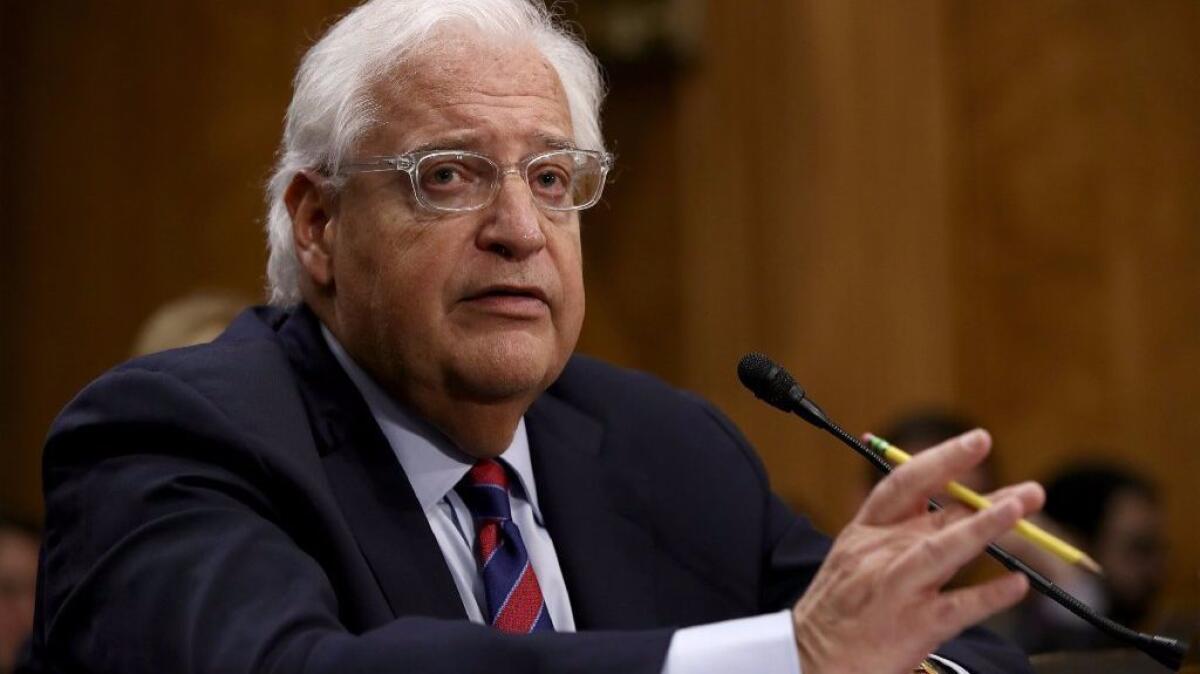Trump’s pick for ambassador to Israel faces hecklers and tough questions

- Share via
Reporting from Washington — David Friedman, President Trump’s nominee to be ambassador to Israel, had barely started his opening remarks at his Senate confirmation hearing Thursday when the protests began.
“Palestinians will always be in Palestine,” shouted a man waving a red, green and black Palestinian flag.
For the record:
4:54 p.m. Jan. 23, 2025A previous version of this article stated that Sen. Charles E. Schumer endorsed the 2015 deal on Iran’s nuclear program. Schumer voted against it.
“You do not represent us!” an American Jew in a kippa shouted a few minutes later.
After guards escorted the hecklers out, Friedman faced tough questioning from members of the Senate Foreign Relations Committee who are skeptical he can conduct diplomacy given his harsh pro-Israel views and incendiary insults.
In recent years, Friedman has called President Obama, other Democratic leaders and critics of Israeli actions anti-Semitic. He likened liberal American Jews to Holocaust-era kapos, Jews who collaborated with the Nazis in concentration camps. He once said the entire State Department had been anti-Jewish for the last half-century.
On Thursday, Friedman said he regretted his heated language.
“I cannot justify these hurtful words, which I deeply regret,” said Friedman, a bankruptcy lawyer who has worked for Trump. “I have rejected and I continue to reject the inflammatory comments.”
Friedman, the son of a rabbi, said he was qualified to be ambassador because of his deep knowledge of Israeli history, born of a life of study and more than 50 visits. He also cited his close friendship with Trump and his fluency in the Hebrew language.
Sen. Tom Udall (D-N.M.) called on the Trump administration to withdraw the nomination, saying Friedman was “completely unfit” for the job. He also introduced a letter from five former ambassadors to Israel from Republican and Democratic administrations who objected to the nominee.
“We need a steady hand in the Middle East, not a flame thrower,” Udall said.
Sen. Benjamin L. Cardin of Maryland, ranking Democrat on the committee, said he was especially distraught over Friedman’s characterization of Sen. Charles E. Schumer of New York, the Senate minority leader, as having capitulated to terrorism for comments made during the heated debate on the 2015 deal that blocked Iran’s ability to produce nuclear weapons.
“I’m having difficulty understanding whether you really can be a diplomat,” Cardin said.
Friedman is a financial backer of expanding Jewish settlements in the West Bank, land claimed by the Palestinians.
He also has dismissed as unworkable the proposed two-state solution to the Israeli-Palestinian conflict.
The diplomatic strategy, which envisions an Israeli nation and a Palestinian nation existing side by side, has been the cornerstone of U.S. policy since the Clinton administration, although Trump said Wednesday that he is willing to abandon it if Israel and the Palestinians can produce a better plan.
Friedman told the committee he would be “delighted” to see Israeli and Palestinian states coexist but questioned whether that was feasible.
He also is a strong advocate of moving the U.S. Embassy from Tel Aviv to Jerusalem, a shift sure to inflame Palestinians who also consider Jerusalem their capital. No other country has put their embassy in Jerusalem because the issue is so sensitive.
During the campaign, Trump vowed to relocate the embassy, but he said Wednesday at a news conference with Israeli Prime Minister Benjamin Netanyahu that the proposed move is still under study.
In response to questions, Friedman said Israel’s annexation of the Golan Heights from Syria during the 1967 war had “worked out quite well.” But he said he does not support calls by Israel’s right wing to annex the West Bank in an effort to block creation of a separate Palestinian state.
Friedman repeated the Israeli argument that a major impediment to peace is that the Palestinians don’t have leaders with whom Israel can negotiate. The Gaza Strip is controlled by the radical Hamas organization, while the West Bank is controlled by the more moderate Palestinian Authority.
Sen. Lindsey Graham (R-S.C.), who introduced Friedman, acknowledged the nominee had made some offensive comments, but backed him as experienced and passionate.
“I believe he is the right guy at the right time,” Graham said. “He’ll be Trump’s voice.”
Other Republicans on the GOP-led committee also appeared supportive, meaning he probably will be confirmed.
For more on international affairs, follow @TracyKWilkinson on Twitter
More to Read
Sign up for Essential California
The most important California stories and recommendations in your inbox every morning.
You may occasionally receive promotional content from the Los Angeles Times.











